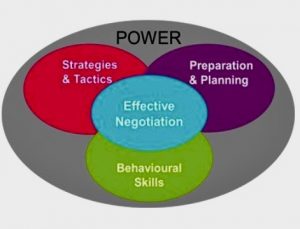HOW NOT TO END A NEGOTIATION EARLY

If you are about to participate in a business or property negotiation, here are some suggestions about proper strategies.
1) Never go into any negotiation unprepared. Make sure even if the subject under discussion is not complex that you have made an objective assessment of your own financial strengths, weaknesses and operating style.
2) Research the other party so that you are informed about their strengths and weaknesses as well. Remember that should the other party be an experienced negotiator any lack of preparation on your part will signal weakness that hurts you by empowering him.
3) Next, list your ‘best and worst case scenarios’. Your worst case scenario will tell you whether or not to walk away should a lower offer be made that falls below your worst case. This exercise is referred to as ‘BATNA’ or ‘best alternative to a negotiated agreement’. Better no deal than a bad deal.
4) Should the other party make an offer which falls within your zone for possible agreement known as ‘ZOPA’, make a counter-offer. The purpose of any negotiation is just that. It isn’t a dart game. The other party isn’t obligated to hit your bull’s eye. He also wants to do well. At the end of the day reasonable compromise is not weakness and both sides look to score a win that meets both of your interests.
5) Lastly, never go into any negotiation by stating your maximum position coupled with a warning that there is no room for compromise. Doing this will bring your discussion to a very early, unsuccessful end.

